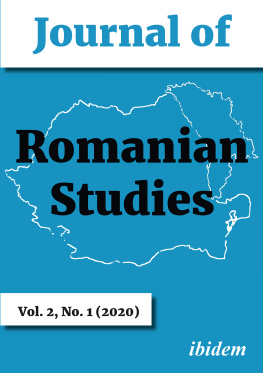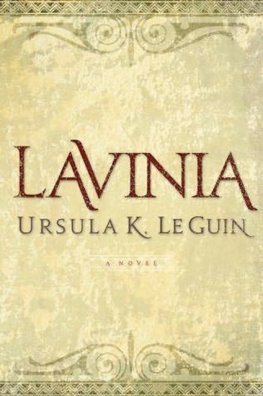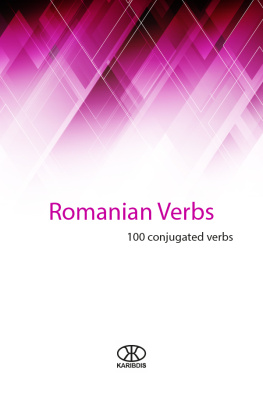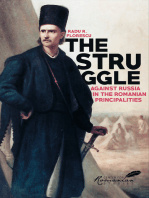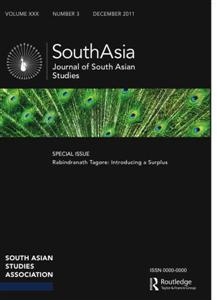Lavinia Stan - Journal of Romanian Studies Volume 2, No. 1 (2020)
Here you can read online Lavinia Stan - Journal of Romanian Studies Volume 2, No. 1 (2020) full text of the book (entire story) in english for free. Download pdf and epub, get meaning, cover and reviews about this ebook. year: 2020, publisher: Ibidem Press, genre: Romance novel. Description of the work, (preface) as well as reviews are available. Best literature library LitArk.com created for fans of good reading and offers a wide selection of genres:
Romance novel
Science fiction
Adventure
Detective
Science
History
Home and family
Prose
Art
Politics
Computer
Non-fiction
Religion
Business
Children
Humor
Choose a favorite category and find really read worthwhile books. Enjoy immersion in the world of imagination, feel the emotions of the characters or learn something new for yourself, make an fascinating discovery.
- Book:Journal of Romanian Studies Volume 2, No. 1 (2020)
- Author:
- Publisher:Ibidem Press
- Genre:
- Year:2020
- Rating:4 / 5
- Favourites:Add to favourites
- Your mark:
- 80
- 1
- 2
- 3
- 4
- 5
Journal of Romanian Studies Volume 2, No. 1 (2020): summary, description and annotation
We offer to read an annotation, description, summary or preface (depends on what the author of the book "Journal of Romanian Studies Volume 2, No. 1 (2020)" wrote himself). If you haven't found the necessary information about the book — write in the comments, we will try to find it.
Journal of Romanian Studies Volume 2, No. 1 (2020) — read online for free the complete book (whole text) full work
Below is the text of the book, divided by pages. System saving the place of the last page read, allows you to conveniently read the book "Journal of Romanian Studies Volume 2, No. 1 (2020)" online for free, without having to search again every time where you left off. Put a bookmark, and you can go to the page where you finished reading at any time.
Font size:
Interval:
Bookmark:

Contents
ibidem-Press, Stuttgart
After successfully guiding the first three inaugural issues, the founding editors of the Journal of Romanian Studies Lavinia Stan, Jules Leger Research Chair and professor of comparative politics at St. Francis Xavier University, Canada; Margaret Hiebert Beissinger, Professor in the Department of Slavic Languages and Literatures at Princeton University, and Radu Cinpoe , head of the Department of Politics and senior lecturer at Kingston University, London, England have handed over the reins of the publication to us.
Together with the Society for Romanian Studies and its members, we owe a tremendous debt of gratitude to Professors Stan, Beissinger and Cinpoe for their vision, persistence, expertise and hard work in creating the JRS . By doing so, they forged a vehicle that enlarges the global scope and extent for scholarship on Romanian and Moldovan topics.
A sincere thank you and well done to our three predecessors.
We take seriously our fiduciary responsibility to complete the vision of the founding editors and make the JRS the premier publication that disseminates notable, multi-disciplinary scholarship on Romanian and Moldovan topics.
In the next three years, we aim to unrelentingly enhance the quality of JRSs content, increase the number and disciplinary variety of submissions, persistently pursue top established and up-and-coming intellectuals/academics to contribute to the journal, and magnify the journals visibility and standing in and outside the academic community.
The editorial team cannot do its work without the aid of the members of the Society of Romanian Studies and its Board, as well other subscribers. We fervently hope that you, our readers, will help us achieve the above-stated goals by submitting articles, identifying potential contributors, serving as reviewers and, when necessary, as translators. And of course, we urge you to spread the word that our journal is an exceptional reference for scholars, students, policy makers, the media, and all who have an interest in the myriad of topics related to Romania and Moldova.
Thank you for your support.
Peter Gross, Co-Editor
Professor Emeritus & former Director
School of Journalism & Electronic Media
The University of Tennessee
Knoxville, TN, U.S.A.
Diane Vancea, Co-Editor
Professor & Vice-rector
Ovidius University
Constanta, Romania
Iuliu Ratiu, Book Editor
Associate lecturer
Department of Modern Languages & Business Communication
The Faculty of Economics & Business Administration
BabeBolyai University
ClujNapoca, Romania
Claudia Lonkin, Editorial Assistant
Graduate Student
Department of History & Classics
University of Alberta
Edmonton, AB, Canada
Alexandra Chiriac
Was there or wasnt there a revolution in our town?
12:08 East of Bucharest (2006, dir. Corneliu Porumboiu)
Abstract: During the mid-1920s Bucharest became home to the Vilna Troupe, an ensemble formed in Vilnius in 1915 and famed for its ground-breaking Yiddish-language productions that toured all over the world. Its collaborations with the Romanian artist M. H. Maxy are the subject of this essay, which demonstrates the experimental nature of several productions that took place in Bucharest during this period. New research material from sources on both sides of the Atlantic makes it possible to reconstruct the outputs of this richly innovative partnership to a much greater extent than before, demonstrating that the vitality of avant-garde theatre in Bucharest has been heretofore underestimated by scholars, its existence obscured by the ephemerality of the performative and by its unwieldy transnational trajectory. An earlier version of this essay won the Graduate Student Essay Prize offered in 2018 by the Society for Romanian Studies.
In 2006, the Romanian film A fost sau n-a fost? won the Camra dOr Prize at the Cannes Film Festival. During its subsequent international release the film was renamed 12:08 East of Bucharest, playing on that paradigm of liminality, something that is East of the East. The original Romanian title is different, but interrogates this same premise. Literally meaning Was there or wasnt there? it refers to the characters quest to establish whether the 1989 Romanian revolution also took place in their provincial town, an impossible pursuit made into satire by the films director Corneliu Porumboiu. This central questionwas there or was there not a revolution?applies equally well to the status of avant-garde theatre in Romania during the interwar period. Among Romanian scholars, there seems to be a consensus that truly experimental theatre had no significant presence in Bucharest, or that, as Paul Cernat writes, the attempts of the Romanian avant-gardes to revolutionise theatre in the 1920s remained only a good intention.
Could it be that a revolution really did take place, yet its traces have become obscured? In the context of Eastern European history, there are good reasons for this omission beyond the essentially ephemeral nature of the performative arts. Firstly, Romanias turbulent trajectory in the twentieth century has left its mark on local archives, libraries, and museums. Recovering visual evidence of performances has been a challenging process of trial and error for the author of this essay, with items erroneously catalogued or stored in unexpected locations as far afield as Boston or New York. Secondly, recent attempts to create a more inclusive account of modernism have understandably focused, as Polish scholar Piotr Piotrowski noted, on the reconstruction of the national sources of avant-garde art. However, as the extent of the avant-gardes mobility becomes increasingly evident, the construction of national and even regional histories may prove too timid a solution, stymied by the geopolitical changes of the twentieth century.
This is especially true in the case of the Vilna Troupe, an itinerant ensemble that brought a new vision of theatre through its radical productions during its time in Romania from 1923 to 1927. Formed in Vilnius in 1915, the group had rapidly forged an international reputation due to its innovative Yiddish-language productions. According to Debra Caplan:
within a year, they [were] the most famous Jewish theatre company in Eastern Europe []. [Within] five years, they [became] a global sensation, drawing the attention of prominent Jewish and non-Jewish theatre artists, politicians, and intellectuals from across Eastern and Western Europe, North and South America, and beyond. They [were] widely regarded as one of the foremost avant-garde theatre companies in the world.
Amongst their audience they could count Sarah Bernhardt, Max Reinhardt, Augustus John, Walter Sickert, and Eugen Ionesco. The Vilna Troupes success benefited from its frequent collaborations with local artists and directors, helping to develop their wide-ranging repertoire and to foster visual experimentation. During 1925 and 1926, M. H. Maxy, a prominent member of the Romanian avant-garde, became one of their foremost collaborators, producing stage designs and promotional materials for the troupe. His work in the theatrical realm is closely interconnected with his other activities during this period, including his collaboration with an educational and commercial venture for modern applied arts and design, and the launch of his own avant-garde periodical,
Font size:
Interval:
Bookmark:
Similar books «Journal of Romanian Studies Volume 2, No. 1 (2020)»
Look at similar books to Journal of Romanian Studies Volume 2, No. 1 (2020). We have selected literature similar in name and meaning in the hope of providing readers with more options to find new, interesting, not yet read works.
Discussion, reviews of the book Journal of Romanian Studies Volume 2, No. 1 (2020) and just readers' own opinions. Leave your comments, write what you think about the work, its meaning or the main characters. Specify what exactly you liked and what you didn't like, and why you think so.

